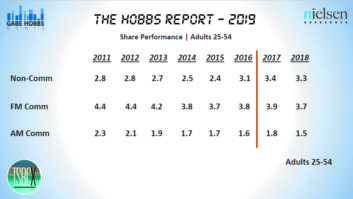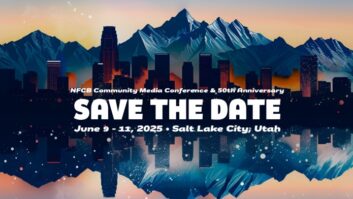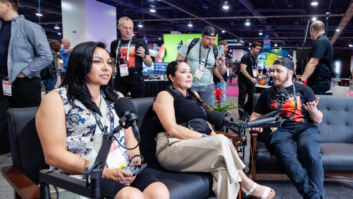The author is membership program director of the National Federation of Community Broadcasters. NFCB commentaries are featured regularly at www.radioworld.com.
This week, thousands came to Detroit to participate in the Allied Media Conference, a gathering of creative minds and those devoted to community-based media in many forms. From a keynote by the founder of the #MeToo movement to lessons on podcasting and facilitation, AMC for 20 years has focused on rejuvenating civic life in many ways.
As a longtime producer and thinker, I came to AMC in part to understand the revolution in audience and creation. For community radio, this disintermediation and the disruption of traditional distribution has, for a few outlets, become an existential threat. How we respond may ultimately determine the fates of some media organizations.
Yet, my best advice is not to race to digital, even as it puts pressure on all of us.
[Read: Community Broadcaster: Having Faith]
The digital space gives a full court press to immediacy, with apps and service hosts beckoning you to start podcasting now. Earlier this year, Podcast Movement organized its 28 Day Challenge, aimed at encouraging people to start podcasting in under a month. Walking you through branding and microphones, the plan laid out was for the person who’s been procrastinating to simply launch the content. These inducements all sound clever and potentially supportive, but are they helpful to media makers?
In my many conversations at the Allied Media Conference, where rooms were packed with veteran and emerging producers and content makers on many platforms, my takeaway was: not really.
The failure of an approach that says “Just do it,” frankly, is that such rallying cries are not as well thought out as communities deserve, and ultimately erode trust because the people doing it may not be the ones communities need. Moreover the internet is full of act-first-think-later podcasts, vlogs and websites that sit there neglected and forgotten, years after the excitement and good intentions that launched them have dissipated, like many of the abandoned buildings that dot neighborhoods in this city of Detroit.
Community radio tussles mightily with this call to jump to digital. With fewer resources than larger organizations, organizational capacity issues, and demanding boards of directors who get insistent, how a station conjures up digital-first programming — not just radio show repurposed for podcasting — is no easy feat. A frequent theme is how the most effective leaders work with stakeholders to be deliberate on digital.
How should your community media organization approach digital? One thing that has been emphasized over and over is planning. Don’t do it because someone suggests you just start. Instead, it’s important to think about sustainability, audience and vision. It’s all well and good to follow the crowd and start podcasting because you’ve been thinking about it, but the lingering questions your organization may have had from the start never went away. How do you plan to be in the digital space in 12 to 18 months? Are you doing this for a particular audience or growth goal, or just because you hear you should? Who do you expect to listen to this, and will they? What is quantifiably unique about your voice that makes it something people will actually listen to and believe in?
Buried in this issue is a salient question: Are you and your organization the right people to lead a discussion, and do you have the credibility to draw the listeners that the topics deserve? If not, are there others in your community whom you can empower and support to be those voices? Such is a complicated subject that won’t come easily to you, or anyone.
Consider the most intriguing podcasting projects in community radio. KRCL’s Podcast Partners endeavors to give the community a chance to be heard with a model that creates both good will and revenue. WRIR remixes its schedule with local and national podcast programming. Radio Noise trains local people to become podcasters and, in turn, fosters new relationships. Each of these efforts is the product of a lot of time and planning, with many in a city or town coming together to bring these valued opportunities to life.
We live in an era of now-now-now. For community radio to see success in the podcasting world, it will take more than rushing in. Diligence rather than racing, in fact, may win the day.







